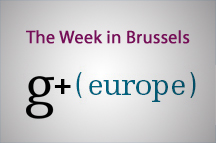 It would be going too far to say this was a defining week for the EU project. But it is difficult to escape the feeling that there are, beneath the surface, tensions about what the future shape of Europe should be.
It would be going too far to say this was a defining week for the EU project. But it is difficult to escape the feeling that there are, beneath the surface, tensions about what the future shape of Europe should be.
Can the EU look after its own affairs? Is it a strong player on the world stage? Can it remain united? There were contrasting signals this week.
 The Euro was in free fall against the dollar (and the pound) after the ECB gave more details of its Quantitative Easing programme. Falling to a 12 year low against the greenback there is again talk of parity. Mario Draghi was up-beat but one cannot help feeling this is the last throw of the dice, with no guarantee of success. Particularly as the Athens-Berlin spat on Greece's bail-out continues, with the Greek Prime Minister Tsipras repeating his call for Germany to pay reparations for World War Two, and its justice minister even claiming the government could start repossessing German owned property in Greece.
The Euro was in free fall against the dollar (and the pound) after the ECB gave more details of its Quantitative Easing programme. Falling to a 12 year low against the greenback there is again talk of parity. Mario Draghi was up-beat but one cannot help feeling this is the last throw of the dice, with no guarantee of success. Particularly as the Athens-Berlin spat on Greece's bail-out continues, with the Greek Prime Minister Tsipras repeating his call for Germany to pay reparations for World War Two, and its justice minister even claiming the government could start repossessing German owned property in Greece.
Europe's recent economic travails have had a major impact on its ability to influence world affairs. Can the combined effect of cheaper exports, the adoption by the European Parliament of Long Term Investment Funds to encourage non-bank investment, and the approval of the new €21 billion investment fund by EU ministers on Wednesday influence that? The jury is out on the latter measure, despite all the officials trooped out to talk it up.

Given all of this, was Commission President Juncker's sensational call on Sunday for the creation of an EU army an effort to mask these difficulties? A diversion tactic? Or a genuine balloon floated? He chose his method of announcing it carefully, in a German paper, and not just any paper, but Die Welt, owned by the Axel Springer group, known to be supportive of the former Luxembourg premier.
It was immediately shot down by the Brits of course. But perhaps it has more legs than people initially thought, especially coming so soon after Juncker appointed former EU Commissioner Michel Barnier as his special adviser for defence matters.
Added to the intrigue is the fact that the proposal came in the week that the U.S. ramped up its military presence in Europe, including with joint exercises close to the EU's border with Russia. Coincidence? Was Juncker's suggesting - with German support - that we Europeans should be able to look after our own affairs and that we shouldn't rely on NATO or the U.S.? Or was he reflecting the unease in some European capitals, including Germany, about the increasing role of Washington in Europe's internal affairs?
All of this in the same week when Juncker's colleague Donald Tusk was being welcomed in the Oval Office by President Obama, with some member states quietly worried that positions being taken by the EU President do not represent their views. One has to wonder how Juncker's proposal went down with both these men, or indeed with the neo-con hawks running Washington foreign policy these days. Not well is my guess.














